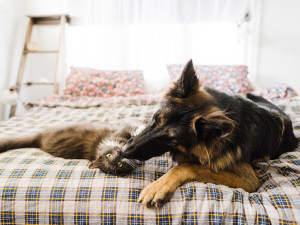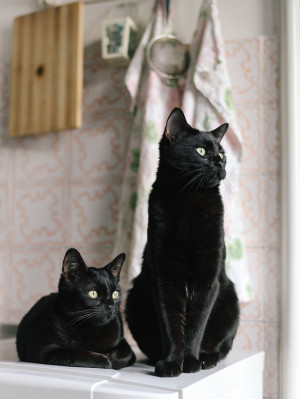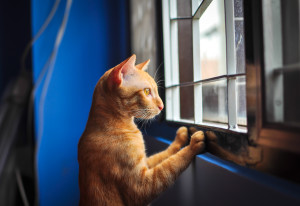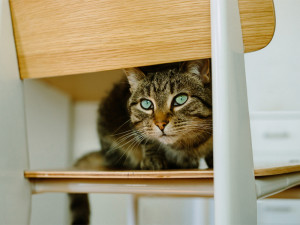How Long Can I Leave My Cat Home Alone?
With automatic feeders and self-cleaning litter trays, your cat could technically look after themselves... but should they?

Share Article
It’s sometimes said that dogs are like toddlers, whereas cats are like housemates. Such a quote is meant to be taken as a joke rather than taken literally, but it remains true that cats are rather more independent than their canine counterparts.
While our cats may enjoy their own company, however, they rely on us to meet their needs and keep them healthy and happy. At some point, you’ll probably need to leave your cat at home for a while and go out (devastating, I know). But, how long can we leave cats alone for? Here’s the lowdown.
How much human interaction do cats need?
This can differ from cat to cat. Many are very independent and prefer their own space, but others can be more ‘dog-like’ and really enjoy the company of humans or other animals. However, even the most independent cat will still need attention from their humans – aim for at least half an hour a day if you can.
In the first 14–16 weeks of life, in particular, it’s important for kittens to get plenty of human interaction. Kittens and adolescent cats who don’t have as much human contact can behave more like feral cats and can find it more difficult to live in a domestic setting.
Likewise, senior cats can need more interaction, too, though this is because they can become less independent as they get older. They might, for example, have arthritis and find grooming more difficult, and so need some extra help.
Can you leave cats while you go to work?
Generally, it’s fine to leave your cat at home while you go to work or you’re otherwise out for the day. However, “If a cat is confined to the house, their toileting facilities tend to become soiled faster, and their options for food and water are much more limited, than if they have free access to the outdoors,” says Dr Anna Foreman, Everypaw Pet Insurance’s in-house vet.
So, cats who are left inside during the day should have places to hide, sleep and go to the toilet, as well as more than enough food and water to last them. And, there should be alternatives if anything becomes soiled.
Can you leave cats overnight?
You can, but again, it’s important to make sure they have enough food and water, as well as places to hide, sleep and go to the toilet. Dr Foreman says that cats who are very young or old, or have specific medical needs, shouldn’t be left for more than a single day or night.
If you have multiple cats, you should consider how well they get along before you leave them at home with each other – particularly overnight. When cats don’t get on, they could fight or even develop a stress-induced disease like cystitis.
Dr Foreman explains, “Cat bites can be fatal if in the wrong place, for example, if they penetrate the chest or abdomen, and stress-induced cystitis (FIC) can lead to a cat not being able to urinate.”
What equipment do you need to make sure they’re OK overnight?
“Automatic feeders and water dispensers are often a good idea to portion meals and water resources,” says Dr Foreman. She says that access to the outdoors can mean that a cat has more freedom, too, but there is a risk. If an accident happens, it could be missed until you get back, preventing your cat from getting the help they need.
A cat cam can be a good purchase, as it will allow you to watch your cat remotely and keep an eye on things.
If you have more than one cat, it’s best for them to have multiple feeders, water dispensers and litter trays to keep resource sharing to a minimum. Outdoor access is ideal when you have multiple cats, too, so they can have time apart from each other if needed.
How long can you leave your cats alone if their physical needs are all taken care of?
Even if your cat has all of the resources they need to be safe and healthy, it’s best not to leave them alone without checking in on them for more than a couple of days or nights. Even if you have a cat cam to watch your cat remotely, it’s more difficult to get there in person if you need to.
How can you stimulate and entertain them while you’re away?
Cats spend a lot of their time sleeping – they can do so for up to 20 hours a day, particularly if older. So, providing them with entertainment isn’t as important as it is for dogs, for example. However, you could leave them with a puzzle feeder, or some toys that are safe to leave cats alone with.
Cat furniture such as scratching posts and cat trees can also provide plenty of fun for cats.
What safety issues are important to consider?
If you’re planning to leave your cat home alone, whether for a few hours in the day or longer, it’s important to cat-proof your home and garden. Conceal wires, make sure that your cat can’t access any potentially harmful chemicals and cover bins.
Outside, cats should have areas to escape to if needed – for example, if another cat or fox were to come into the garden. If a cat does not have good road sense, or if a house is close to a main road, then an enclosed garden or ‘catio’ should be considered instead of free outdoor access.
Essentially, while there might be exceptions for some kittens and senior cats, and cats with complex medical conditions, it’s probably fine for you to leave your cat at home for a night or two. However, it’s important to make sure that you’ve left them with everything they need and more, and that their surroundings will be as safe for them as possible.
If you’re going to be away for longer, it might be best to get a friend or neighbour to check in on your feline, or leave them with someone you trust.

Adam England
Adam England is a lifestyle and culture journalist who has written for publications including PetsRadar, Verywell Mind, People and Healthline. When he’s not writing, he might be visiting his parents’ Golden Retriever, looking up cats for adoption, or getting into arguments over music.
Related articles
![Two black cats staring out window.]()
5 Signs You Should Get Your Cat a Cat
Because 8 paws are better than 4 when it comes to pushing stuff off the table
![White cat switching on lamp on couch]()
Why Does Your Cat Wake You Up at Night?
You want to sleep, your cat wants to party. Here’s how to deal with it
![orange cat looking out window]()
Is Your Cat’s Separation Anxiety Ruining Their Life and Yours?
Why your cat freaks out when you’re away (and how to help)
![]()
How Cat Tracking Made Me A Better Pet Parent
Finally, the secrets to my cat’s outdoor life have been unlocked
![Cat sitting on a kitchen chair, looking at the camera]()
How to Kitten-Proof Your House
A cat behaviourist’s 10 steps for keeping your cat out of trouble






